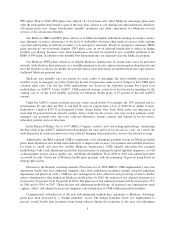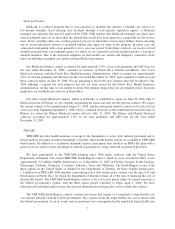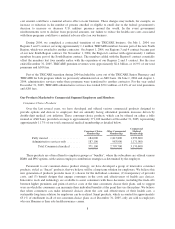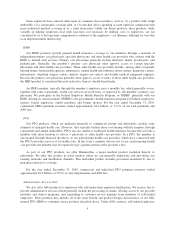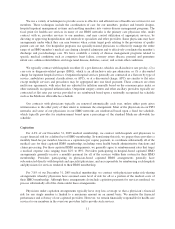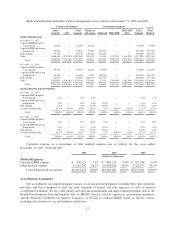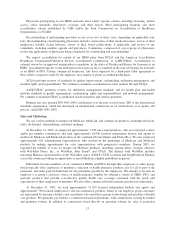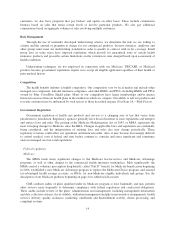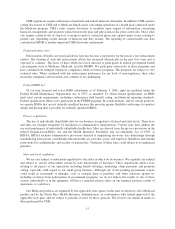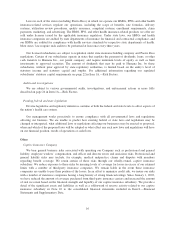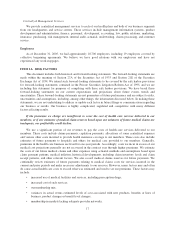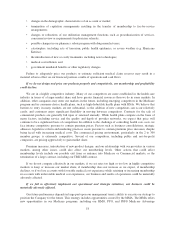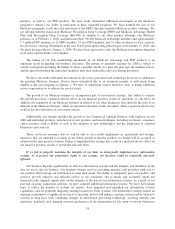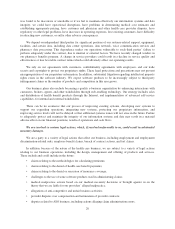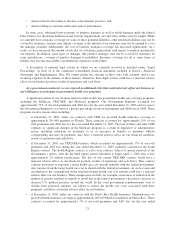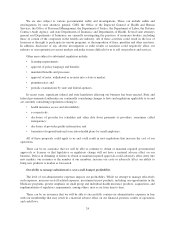Humana 2005 Annual Report Download - page 24
Download and view the complete annual report
Please find page 24 of the 2005 Humana annual report below. You can navigate through the pages in the report by either clicking on the pages listed below, or by using the keyword search tool below to find specific information within the annual report.customers, we also have programs that pay brokers and agents on other bases. These include commission
bonuses based on sales that attain certain levels or involve particular products. We also pay additional
commissions based on aggregate volumes of sales involving multiple customers.
Risk Management
Through the use of internally developed underwriting criteria, we determine the risk we are willing to
assume and the amount of premium to charge for our commercial products. In most instances, employer and
other groups must meet our underwriting standards in order to qualify to contract with us for coverage. Small
group laws in some states have imposed regulations which provide for guaranteed issue of certain health
insurance products and prescribe certain limitations on the variation in rates charged based upon assessment of
health conditions.
Underwriting techniques are not employed in connection with our Medicare, TRICARE, or Medicaid
products because government regulations require us to accept all eligible applicants regardless of their health or
prior medical history.
Competition
The health benefits industry is highly competitive. Our competitors vary by local market and include other
managed care companies, national insurance companies, and other HMOs and PPOs, including HMOs and PPOs
owned by Blue Cross/Blue Shield plans. Many of our competitors have larger memberships and/or greater
financial resources than our health plans in the markets in which we compete. Our ability to sell our products and
to retain customers may be influenced by such factors as those described on page 18 in Item 1A.—Risk Factors.
Government Regulation
Government regulation of health care products and services is a changing area of law that varies from
jurisdiction to jurisdiction. Regulatory agencies generally have broad discretion to issue regulations and interpret
and enforce laws and rules. The passing of the Medicare Modernization Act of 2003, or MMA, represents the
most sweeping changes to Medicare since the BBA. Changes in applicable laws and regulations are continually
being considered, and the interpretation of existing laws and rules also may change periodically. These
regulatory revisions could affect our operations and financial results. Also, it may become increasingly difficult
to control medical costs if federal and state bodies continue to consider and enact significant and sometimes
onerous managed care laws and regulations.
Federal regulation
Medicare
The MMA made many significant changes to the Medicare fee-for-service and Medicare Advantage
programs, as well as other changes to the commercial health insurance marketplace. Most significantly, the
MMA created a voluntary prescription drug benefit, called “Part D” benefit, for Medicare beneficiaries beginning
in 2006, established a new Medicare Advantage program to replace the Medicare+Choice program, and enacted
tax-advantaged health savings accounts, or HSAs, for non-Medicare eligible individuals and groups. See the
description of our Medicare products beginning on page 4 for additional discussion.
CMS conducts audits of plans qualified under its Medicare program at least biannually and may perform
other reviews more frequently to determine compliance with federal regulations and contractual obligations.
These audits include review of the plans’ administration and management, including management information
and data collection systems, fiscal stability, utilization management and physician incentive arrangements, health
services delivery, quality assurance, marketing, enrollment and disenrollment activity, claims processing, and
complaint systems.
14



